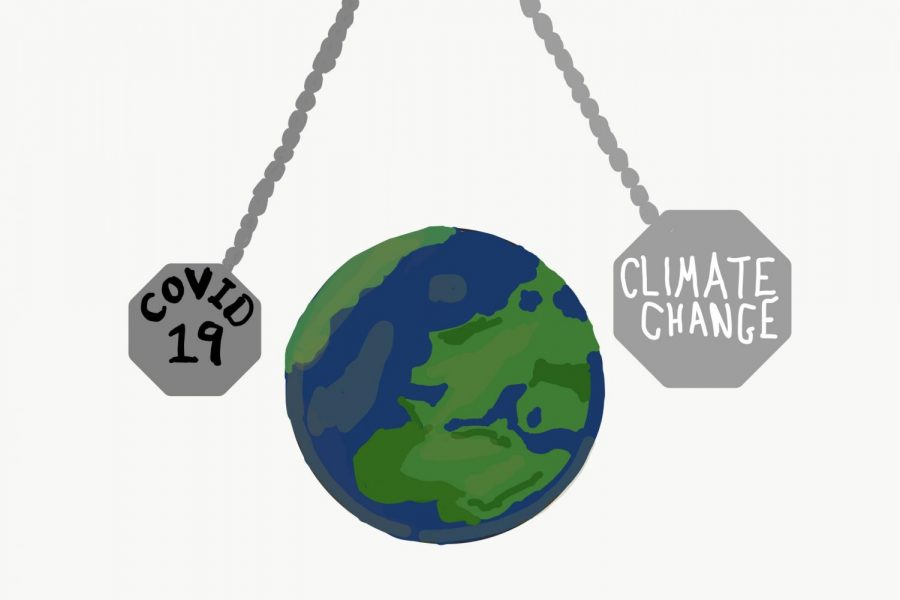What the Coronavirus Response Can Teach us About Climate Change
IMMINENT THREATS: While Coronavirus and Climate Change are two very different issues, they both require a bold response, or else earth will suffer dire consequences.
March 31, 2020
China, the world’s largest producer of greenhouse gas emissions, recently experienced a sudden decrease in air pollution, and according to research conducted at Stanford University, this change likely prevented thousands of pollution-related premature deaths. This seemingly monumental step, however, was not the result of a boost in renewable energy or progressive government policy, but was rather one of the many examples of the unintended environmental benefits caused by the COVID-19 pandemic.
With economies around the world coming to a near standstill due to the virus, the business activity usually responsible for water and air pollution has largely ceased. Just as the air in China has cleared up, so has the water in Italy, where fish are becoming visible in the normally-merky Venice canals.
These accidental environmental triumphs in no way make up for the immense human suffering caused by the virus, but they do prove that, just as governments have come together to address the current pandemic, they can also unite to tackle the urgent issue of climate change.
Addressing climate change will require an approach vastly different than that used to suppress a viral outbreak. However, the same principles that have guided the world’s response to Coronavirus must be at the center of any successful effort to save our planet.
The COVID-19 pandemic has affected all parts of the world, changing everyday life for billions of people and forcing countries to work together in an unprecedented fashion. No nation is immune to the pandemic, no matter the size of its military or its GDP. This means none of us are truly safe from the virus until all of us are.
The same can be said for climate change. It has global implications and thus requires a global response. Rising sea levels are beginning to wipe out communities, poor air quality is leaving people around the world at daily risk and rising temperatures are threatening humanity’s very existence. Just as governments and economies have taken drastic measures to curb the spread of COVID-19, they must also commit to the bold action necessary to save our planet.
The government’s response to Coronavirus has not been completely free from partisan politics and special interests. In fact, as millions of Americans spent the last month living in medical and economic uncertainty, the Trump administration repeatedly failed to reach an agreement with Senate Democrats to send much needed financial relief to communities across the nation.
The efforts of state and local governments have further been hindered by misinformation spread by the President, who has repeatedly made statements underestimating the pandemic’s severity and exaggerating the effectiveness of the government’s actions.
That said, the global response to the Coronavirus pandemic has provided numerous signs of hope. Through international bodies such as the United Nations and World Health Organization, world leaders have convened to build coordinated efforts. Businesses around the globe have adjusted and ceased operations. Prominent Scientists have honorably served the public as messengers of truth, such as Dr. Anthony Fauci, the veteran Director of the National Institute of Allergy and Infectious Diseases. And billions of people have drastically changed their habits, practicing social distancing and increased hygiene.
These comprehensive strategies have saved millions of lives, and if used to combat climate change, they could save millions more, and potentially even our planet. In order for this to happen though, it will require an unprecedented level of political courage from world leaders.
For far too long, powerful corporations have been allowed to continue making profits at the expense of our planet. According to a study by the Climate Accountability Institute published in 2017, around 70% of global greenhouse gas emissions were produced by just 100 companies. As these businesses have continued to line the pockets of their wealthy shareholders, low-income communities around the world have been left to bear the brunt of climate change.
While the global response to Coronavirus has lacked in many regards, especially in terms of providing adequate support to vulnerable communities, it has served as an important reminder that the crisis of climate change can and must be addressed. In order to save our planet, all nations must unite around a shared vision, voices of reason and science must be given center stage and people must be placed above profit.







